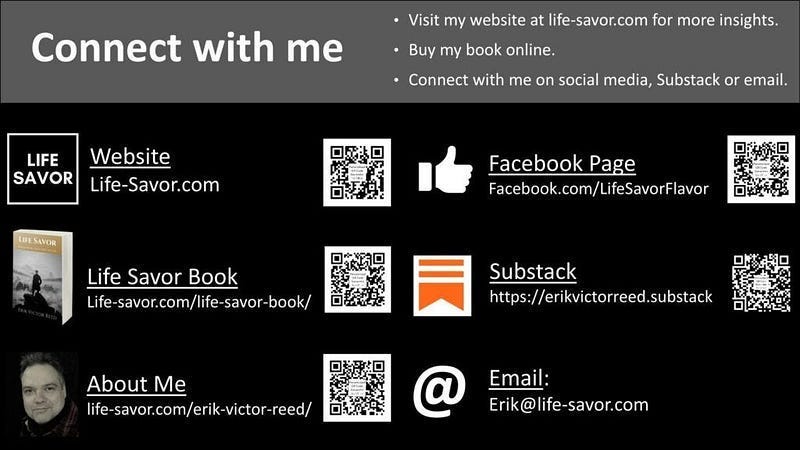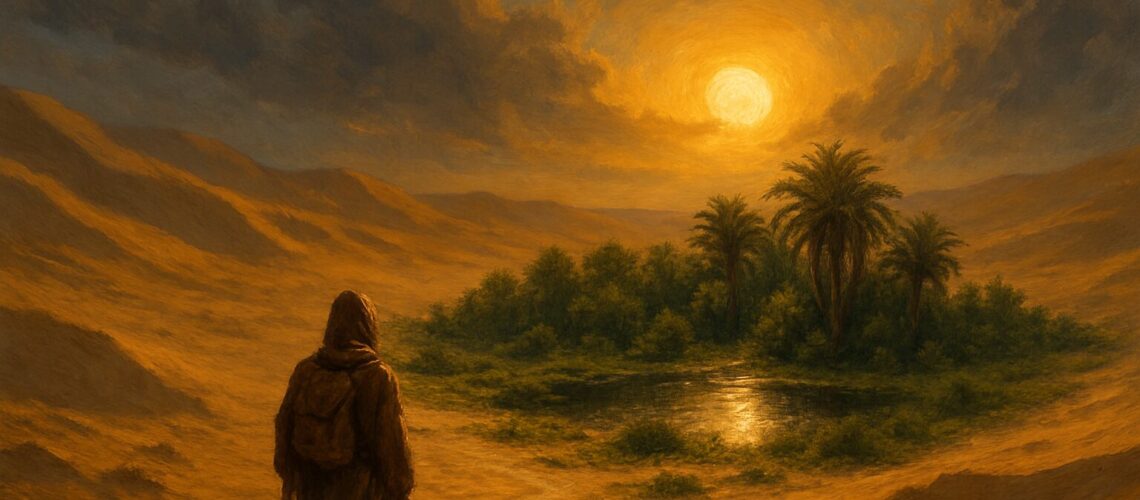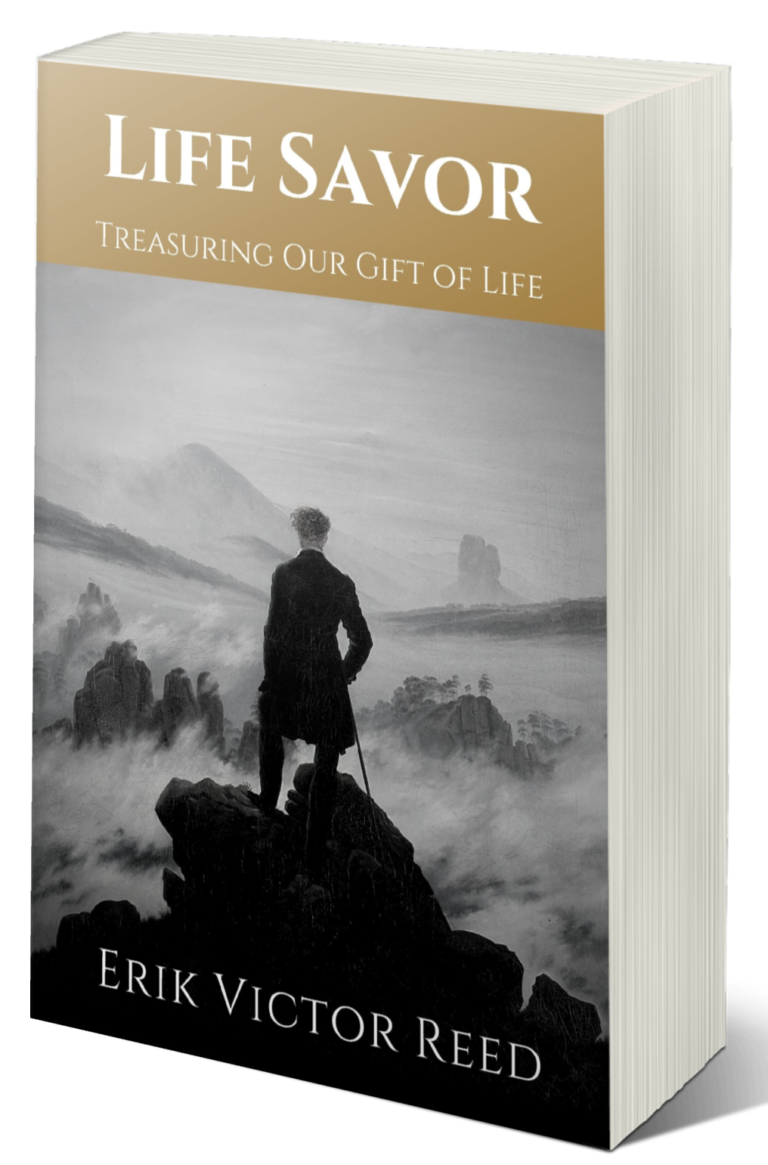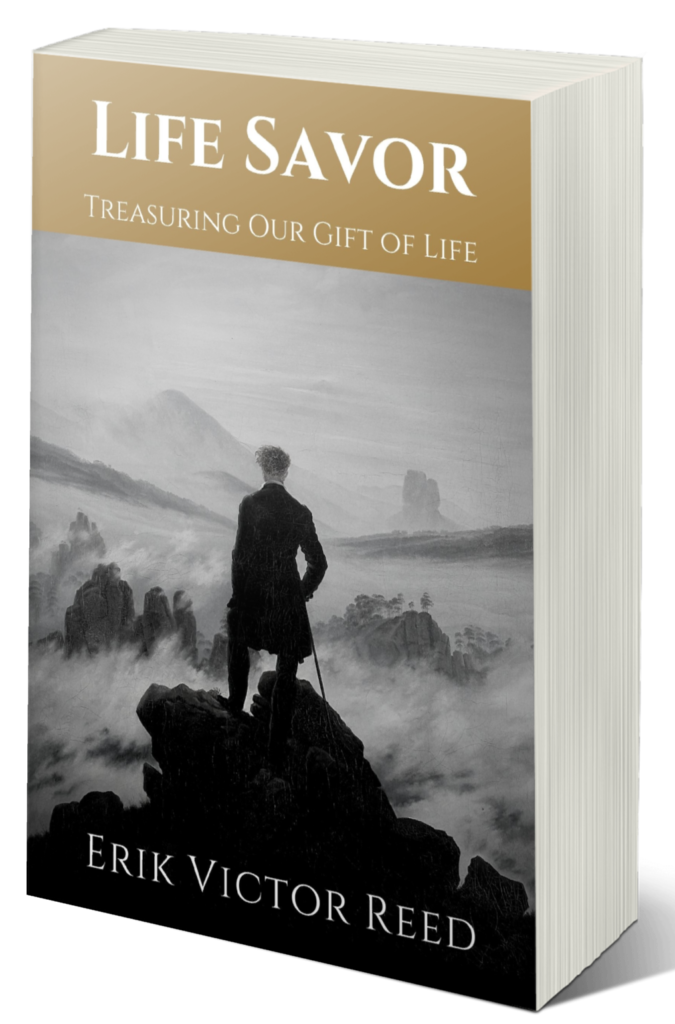A meditation on carrying hope, and visiting it when you’re ready
There are days when the world is a desert: glare, heat, no shade. On those days we don’t need pep talks; we need water. And part of staying sane is remembering that the water exists — even when we’re too tired to walk to it.
Call it the oasis: gratitude, mortality awareness, wonder — the perspectives that soften the hard light and make the air breathable again. We don’t have to drink every hour to survive the day. Sometimes it’s enough to know the spring is there, mapped in our pocket, waiting until we can make the walk. As I say in Life Savor: we needn’t always feel a perspective for it to still help us; knowing we can “return to an oasis of benevolent perspective” steadies us — as long as, at times, we do also make the return.
The Map in Your Pocket
The back-pocket perspective is a promise to yourself: I can come back to gratitude; I can come back to meaning. It asks for no bravado. It simply says: Not today, maybe. But the path is there. I’ll take it when I can.
This is not denial. It’s orientation. It keeps you facing the direction of life when the wind is hard in your face. It’s the difference between being lost and being on pause.
When the Oasis Is Not the Path
There are hours when returning is impossible, and hours when it would be wrong. If an irreplaceable value has just been torn from your life, forcing yourself to feel grateful would be a betrayal of that love you hold. After a shattering loss, mourning isn’t to be escaped so much as it’s to be endured.
Give grief the dignity of its full weight. Marcel Proust’s old truth still applies: “We are healed of a suffering only by experiencing it to the full.”
The oasis remains. It exists. But you will not be marched there. You will walk when you are ready.
How the Return Works
The return is rarely dramatic. It’s usually ordinary, nearly invisible.
- A hand around a warm mug in morning light.
- A remembered passage that once broke you open.
- A breath that goes all the way down.
- A small act of usefulness that puts your soul back in the conversation.
Raphael Cushnir’s guidance helps: emotions “don’t need to be felt forever… just long enough to have their say.”
Let them speak. When they finish, there is often a clearing — enough space to take a step toward the spring.
Sometimes mortality awareness turns us to the oasis. A gentle, bracing reminder that life is brief, and therefore precious, and therefore worth turning back toward.
Two Quiet Returns
At the sink. A person stands rinsing dishes at the end of a brutal week — no triumphs, only loose ends. Water runs hot over their hands. In the window, a slice of sky is turning amber. They feel the ache still there, but the color takes hold. There you are, the world seems to say. Something loosens. A small return.
On the sidewalk at night. Another person, hollowed by a fresh loss, can’t face the house yet. They walk. A breeze lifts; a distant song drifts from an open window. They stop under a streetlight and close their eyes. Nothing is fixed. But the night air — real cool now — is undeniable. The future flutters like a curtain. It’s a very small return.
Neither moment is a reversal. Both are a turning. The spring is still a walk away, but the body remembers the direction.
What the Oasis Gives Back
Return often enough and the senses wake: taste finds the salt and honey again, sound separates music from noise, sight notices textures and color instead of only tasks. The “aesthetic experience” of being — the felt fact of existence— comes back online. And with it, gratitude bridges the long road between mile markers, helping life feel abundant again, even as we climb.
Mortality awareness joins gratitude here, not as a scold but as a blessing: prepare now for death so as to intensify and fulfill your life.
It’s a clear-eyed kind of kindness to yourself — the kind that asks, What can be cherished today while I still have a today?
What the Oasis Is Not
It is not a mandate to smile. Not a requirement to be “on” all the time. Not an airbrush over grief. The back-pocket map was never meant to shame you into cheerfulness. As I mention in Life Savor, be wary of the “two-dimensional Cheshire grin,” where we flatten our emotional life to please an ideal. The cost is high: we lose contact with our authentic values and self. We become dishonest—with our self most of all.
The oasis belongs to the honest. It is for people who cry as well as laugh, who feel the thunderstorm and the sunset, who refuse the lobotomy of constant positivity. It is a place where humanity is not corrected but carried.
Returning, Practically
- Name the spring. Write down three personal ways you know you return (a walk, a song, a call, a meditation). Keep the list where you’ll see it on hard days.
- Respect the interval. When grief is fresh, don’t demand gratitude. Let time and truth do their work; the return will come when you are ready.
- Use mortality as a frame, not a fear. Let it highlight, not terrify — a frame that makes the picture of today more vivid.
- Take the tiniest step. The first sip is often ordinary: one breath by an open window. One sentence in a notebook. One small kindness offered or accepted.
Closing Thought
You don’t have to live at the oasis to be saved by it. You only have to remember it exists — and return when you can. On the worst days, the map in your pocket is already a kind of hope. On better days, your feet find the path. And when you arrive, even for a moment, water is water.
We are not promised endless ease. We are promised this: the chance to be alive — to hurt because things matter, to heal by feeling fully, to frame our days so their worth shows through. Then, when the heat rises again, we know what to do.
We reach for the map. We take the first step. We make the return.
For more like this, visit the broader project at life-savor.com, or explore the Life Savor book itself.
To learn more about Life Savor’s philosophy,
read Life Savor: Treasuring Our Gift of Life by Erik Victor Reed.








